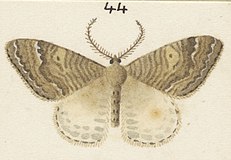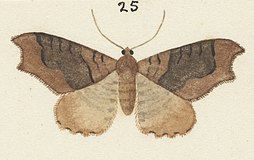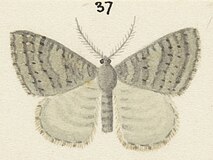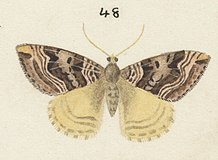File:MA I437612 TePapa Plate-XIII-The-butterflies full.jpg

Original file (8,402 × 10,568 pixels, file size: 16.51 MB, MIME type: image/jpeg)
Captions
Captions
Summary
[edit]| Warning | The original file is very high-resolution. It might not load properly or could cause your browser to freeze when opened at full size. | Open in ZoomViewer |
|---|
| George Vernon Hudson: Plate XIII. The butterflies and moths of New Zealand.
( |
|||||||||||||||||||||
|---|---|---|---|---|---|---|---|---|---|---|---|---|---|---|---|---|---|---|---|---|---|
| Artist |
artist QS:P170,Q2064874 |
||||||||||||||||||||
| Title |
Plate XIII. The butterflies and moths of New Zealand. |
||||||||||||||||||||
| Description |
English: Watercolour by George Hudson. Plate XIII. The butterflies and moths of New Zealand.
|
||||||||||||||||||||
| Date |
circa 1927 date QS:P571,+1927-00-00T00:00:00Z/9,P1480,Q5727902 |
||||||||||||||||||||
| Medium |
watercolor on paper medium QS:P186,Q22915256;P186,Q11472,P518,Q861259 |
||||||||||||||||||||
| Dimensions |
height: 31.6 cm (12.4 in); width: 25.4 cm (10 in) dimensions QS:P2048,31.6U174728 dimensions QS:P2049,25.4U174728 |
||||||||||||||||||||
| Collection |
institution QS:P195,Q915603 |
||||||||||||||||||||
| Accession number |
1992-0035-2304 |
||||||||||||||||||||
| Source/Photographer | https://collections.tepapa.govt.nz/object/1129122 | ||||||||||||||||||||
| Permission (Reusing this file) |
No Known Copyright Restrictions | ||||||||||||||||||||
| Other versions | |||||||||||||||||||||
Licensing
[edit]| Public domainPublic domainfalsefalse |
|
This work is in the public domain in its country of origin and other countries and areas where the copyright term is the author's life plus 70 years or fewer. Note that a few countries have copyright terms longer than 70 years: Mexico has 100 years, Jamaica has 95 years, Colombia has 80 years, and Guatemala and Samoa have 75 years. This image may not be in the public domain in these countries, which moreover do not implement the rule of the shorter term. Honduras has a general copyright term of 75 years, but it does implement the rule of the shorter term. Copyright may extend on works created by French who died for France in World War II (more information), Russians who served in the Eastern Front of World War II (known as the Great Patriotic War in Russia) and posthumously rehabilitated victims of Soviet repressions (more information).
| |
| This file has been identified as being free of known restrictions under copyright law, including all related and neighboring rights. | |
https://creativecommons.org/publicdomain/mark/1.0/PDMCreative Commons Public Domain Mark 1.0falsefalse
| Public domainPublic domainfalsefalse |
This New Zealand work is in the public domain in New Zealand, because its copyright has expired or it is not subject to copyright (details). According to the New Zealand Copyright Act of 1994 as elaborated on by the Standing Committee on Copyright of the Library and Information Association of New Zealand (LIANZA), as of May 2011:
1 Some government publications are not subject to copyright, including bills, acts, regulations, court judgments, royal commission and select committee reports, etc. See references [1] or [2] for the full list. Note that this work might not be in the public domain in countries that do not apply the rule of the shorter term and have copyright terms longer than life of the author plus 50 years. In particular, Mexico is 100 years, Jamaica is 95 years, Colombia is 80 years, Guatemala and Samoa are 75 years, Switzerland and the United States are 70 years, and Venezuela is 60 years.
|
|||||||||||||||||||||||
File history
Click on a date/time to view the file as it appeared at that time.
| Date/Time | Thumbnail | Dimensions | User | Comment | |
|---|---|---|---|---|---|
| current | 02:49, 25 September 2018 |  | 8,402 × 10,568 (16.51 MB) | Ambrosia10 (talk | contribs) | pattypan 18.02 |
You cannot overwrite this file.
File usage on Commons
The following 52 pages use this file:
- User:DCB/Landkreis Görlitz/2018 September 21-30
- File:Fig 10 MA I437612 TePapa Plate-XIII-The-butterflies full (cropped).jpg
- File:Fig 11 MA I437612 TePapa Plate-XIII-The-butterflies full (cropped).jpg
- File:Fig 12 MA I437612 TePapa Plate-XIII-The-butterflies full (cropped).jpg
- File:Fig 13 MA I437612 TePapa Plate-XIII-The-butterflies full (cropped).jpg
- File:Fig 14 MA I437612 TePapa Plate-XIII-The-butterflies full (cropped).jpg
- File:Fig 15 MA I437612 TePapa Plate-XIII-The-butterflies full (cropped).jpg
- File:Fig 16 MA I437612 TePapa Plate-XIII-The-butterflies full (cropped).jpg
- File:Fig 17 MA I437612 TePapa Plate-XIII-The-butterflies full (cropped).jpg
- File:Fig 18 MA I437612 TePapa Plate-XIII-The-butterflies full (cropped).jpg
- File:Fig 19 MA I437612 TePapa Plate-XIII-The-butterflies full (cropped).jpg
- File:Fig 1 MA I437612 TePapa Plate-XIII-The-butterflies full (cropped).jpg
- File:Fig 20 MA I437612 TePapa Plate-XIII-The-butterflies full (cropped).jpg
- File:Fig 21 MA I437612 TePapa Plate-XIII-The-butterflies full (cropped).jpg
- File:Fig 22 MA I437612 TePapa Plate-XIII-The-butterflies full (cropped).jpg
- File:Fig 23 MA I437612 TePapa Plate-XIII-The-butterflies full (cropped).jpg
- File:Fig 24 MA I437612 TePapa Plate-XIII-The-butterflies full (cropped).jpg
- File:Fig 25 MA I437612 TePapa Plate-XIII-The-butterflies full (cropped).jpg
- File:Fig 26 MA I437612 TePapa Plate-XIII-The-butterflies full (cropped).jpg
- File:Fig 27 MA I437612 TePapa Plate-XIII-The-butterflies full (cropped).jpg
- File:Fig 28 MA I437612 TePapa Plate-XIII-The-butterflies full (cropped).jpg
- File:Fig 29 MA I437612 TePapa Plate-XIII-The-butterflies full (cropped).jpg
- File:Fig 2 MA I437612 TePapa Plate-XIII-The-butterflies full (cropped).jpg
- File:Fig 30 MA I437612 TePapa Plate-XIII-The-butterflies full (cropped).jpg
- File:Fig 31 MA I437612 TePapa Plate-XIII-The-butterflies full (cropped).jpg
- File:Fig 32 MA I437612 TePapa Plate-XIII-The-butterflies full (cropped).jpg
- File:Fig 33 MA I437612 TePapa Plate-XIII-The-butterflies full (cropped).jpg
- File:Fig 34 MA I437612 TePapa Plate-XIII-The-butterflies full (cropped).jpg
- File:Fig 35 MA I437612 TePapa Plate-XIII-The-butterflies full (cropped).jpg
- File:Fig 36 MA I437612 TePapa Plate-XIII-The-butterflies full (cropped).jpg
- File:Fig 37 MA I437612 TePapa Plate-XIII-The-butterflies full (cropped).jpg
- File:Fig 38 MA I437612 TePapa Plate-XIII-The-butterflies full (cropped).jpg
- File:Fig 39 MA I437612 TePapa Plate-XIII-The-butterflies full (cropped).jpg
- File:Fig 3 MA I437612 TePapa Plate-XIII-The-butterflies full (cropped).jpg
- File:Fig 40 MA I437612 TePapa Plate-XIII-The-butterflies full (cropped).jpg
- File:Fig 41 MA I437612 TePapa Plate-XIII-The-butterflies full (cropped).jpg
- File:Fig 42 MA I437612 TePapa Plate-XIII-The-butterflies full (cropped).jpg
- File:Fig 43 MA I437612 TePapa Plate-XIII-The-butterflies full (cropped).jpg
- File:Fig 44 MA I437612 TePapa Plate-XIII-The-butterflies full (cropped).jpg
- File:Fig 45 MA I437612 TePapa Plate-XIII-The-butterflies full (cropped).jpg
- File:Fig 46 MA I437612 TePapa Plate-XIII-The-butterflies full (cropped).jpg
- File:Fig 47 MA I437612 TePapa Plate-XIII-The-butterflies full (cropped).jpg
- File:Fig 48 MA I437612 TePapa Plate-XIII-The-butterflies full (cropped).jpg
- File:Fig 49 MA I437612 TePapa Plate-XIII-The-butterflies full (cropped).jpg
- File:Fig 4 MA I437612 TePapa Plate-XIII-The-butterflies full (cropped).jpg
- File:Fig 50 MA I437612 TePapa Plate-XIII-The-butterflies full (cropped).jpg
- File:Fig 5 MA I437612 TePapa Plate-XIII-The-butterflies full (cropped).jpg
- File:Fig 6 MA I437612 TePapa Plate-XIII-The-butterflies full (cropped).jpg
- File:Fig 7 MA I437612 TePapa Plate-XIII-The-butterflies full (cropped).jpg
- File:Fig 8 MA I437612 TePapa Plate-XIII-The-butterflies full (cropped).jpg
- File:Fig 9 MA I437612 TePapa Plate-XIII-The-butterflies full (cropped).jpg
- File:MA I437612 TePapa Plate-XIII-The-butterflies full.jpg
Structured data
Items portrayed in this file
depicts
- Paintings in Te Papa
- The butterflies & moths of New Zealand (1928) original plates
- Epiphryne undosata
- Epiphryne xanthaspis
- Epiphryne charidema
- Aponotoreas dissimilis
- Epiphryne verriculata
- Xanthorhoe bulbulata
- Xanthorhoe camelias
- Homodotis megaspilata
- Homodotis falcata
- Asaphodes abrogata
- Asaphodes stephanitis
- Xanthorhoe orophylla
- Austrocidaria parora
- Gingidiobora nebulosa
- Austrocidaria cedrinodes
- Xanthorhoe umbrosa
- Gingidiobora subobscurata
- Chrysolarentia subrectaria
- Asaphodes limonodes
- Epyaxa rosearia
- Epyaxa venipunctata
- Asaphodes periphaea
- Helastia semisignata
- Xanthorhoe orophylloides
- Asaphodes chlamydota
- Asaphodes obarata
- Asaphodes chionogramma
- Xanthorhoe lophogramma
- Xanthorhoe semifissata
- Asaphodes prasinias
- Asaphodes oxyptera
- Asaphodes camelias




















































